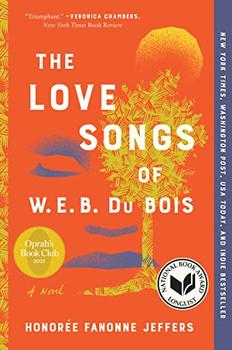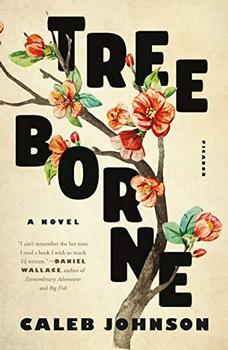Summary | Excerpt | Reviews | Beyond the book | Read-Alikes | Genres & Themes | Author Bio

Charlie Smith's novel Ginny Gall is a coming-of-age story set in the early 20th century, revolving around the experiences of a black "everyman" named Delvin Walker. Beginning with his birth in the Red Row district of Chattanooga, Tennessee in 1913, through his return to his hometown in 1943, readers are given a glimpse of what life might have been like for men of color in the American South during those three decades, years that encompassed two world wars as well as The Great Depression.
The book's title is believed to reference Guinea, the origin of much of the slave trade; its colloquial use dates from the era covered in the novel and is a term reserved for suffering that, in the author's words, encompass "the hell beyond hell, hell's hell," a phrase that accurately describes most of Delvin's post-adolescent experiences. His life is one of near-constant trouble, much of it characterized by his running away from real or feared abuse by the whites around him; he's a victim of circumstance, often completely innocent of the crimes others suppose he has committed simply based on the color of his skin. By no means a stereotype, Delvin learns to read at an early age and is very intelligent, falling in love, for example, with the works of Shakespeare. At no point does he abandon his dream of becoming a writer, inspired by early black authors such as Frederick Douglass and W.E.B. Du Bois (See 'Beyond the Book')
Smith draws three-dimensional characters in excellent fashion and has an exceptional ear for dialog, but the novel's true highlight is the writing style. Smith's background as a poet is quite in evidence and every bit of his prose is beautifully lyrical, soaring off the page. A typical example follows, with the author relaying a scene during which Delvin and his friends gather in a kitchen after a long night following the bombing of a nearby church:
But the sunlight that couldn't be stopped shone on the red bread-box and on the bottle-green icebox and on the blue, marble-painted crock containing cucumber pickles and on the polished black enameled woodstove and on the pale blue safe with the pink floribunda roses painted on the two doors, and he watched all these take their true colors back to themselves and the faces of the men and Mrs. Parker take on the colors and shapes that they carried through daytime that were different from their faces at night under even the brightest light, somehow more supple and creased and softer really than at night, even if they looked more battered and old. He could smell the scents of mock banana flowers and gardenia and pine rosin from the yard, and smell the grass and the dew itself, and it was as if the sun brought these in too. And all of them, including Oliver leaning against the counter sipping a cup of black coffee, felt something hidden inside themselves brought back out into the open, something made up of sorrow and vigor and reverence all bound together. They felt restored, resolved. And this feeling, too, like the tide of light, passing even as they felt it.
It is not obvious from the text that Smith is white — from my viewpoint, admittedly that of a white woman who grew up in the Midwest, he seems to have completely captured what a black man might have felt during the time period: knowing just how unfairly he was being treated; the irrational discrimination he faced; being regarded as less than human because his skin is black; and the intense frustration at knowing he's more intelligent than the whites around him and yet having to act dumb because otherwise he'd be hurt.
The author expresses these feelings with intensity and realism, and I came away from the book with a deeper understanding of the heart of the racial divide that continues to affect us (the United States in particular) to this day. That's not to say the book condemns current society, black or white — the attitudes and situations in the book are firmly rooted in the time period portrayed. It does, however, provide a level of insight into how the past informs the present, and reminds us of not only how much we've moved beyond the bigotry of relatively recent history but also how far we have yet to go to achieve racial equality.
Nearly every paragraph in the book is a work of art and on a page-by-page basis I am utterly in awe of this author's writing. Unfortunately it becomes too much of a good thing relatively early on. Smith's descriptions are lush but extensive; they seem to go on forever and bog down Delvin's story considerably, giving the narrative a plodding, elegiac tone. The author does include what could be some fairly exciting scenes but even these are weighed down by observations of every little detail. There's a very interesting plot but it gets buried under the verbiage.
I expect Ginny Gall will garner a number of rave reviews for the quality of Smith's writing, as well encourage a certain amount of debate about whether a white author can convincingly write about the African American experience (the conversation surrounding the male authorship of Memoirs of a Geisha comes to mind). While the book may be slow-going, readers who appreciate a well-crafted novel will almost certainly find that it's worth the time.
![]() This review was originally published in The BookBrowse Review in March 2016, and has been updated for the
February 2017 edition.
Click here to go to this issue.
This review was originally published in The BookBrowse Review in March 2016, and has been updated for the
February 2017 edition.
Click here to go to this issue.

If you liked Ginny Gall, try these:

The Love Songs of W.E.B. Du Bois
by Honorée Fannone Jeffers
Published 2022
The 2020 National Book Award–nominated poet makes her fiction debut with this magisterial epic - an intimate yet sweeping novel with all the luminescence and force of Homegoing; Sing, Unburied, Sing; and The Water Dancer - that chronicles the journey of one American family, from the centuries of the colonial slave trade through the Civil War ...

by Caleb Johnson
Published 2019
Treeborne is a celebration and a reminder: of how the past gets mixed up in thoughts of the future; of how home is a story as much as a place.
Your guide toexceptional books
BookBrowse seeks out and recommends the best in contemporary fiction and nonfiction—books that not only engage and entertain but also deepen our understanding of ourselves and the world around us.